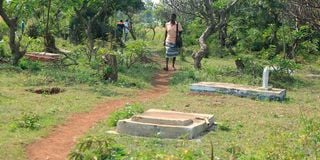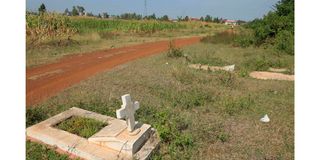Premium
Shame of the dead not resting in eternal peace

Residents use a path that cuts across the Mamboleo cemetery in Kisumu on July 4, 2023. The cemetery is experiencing many challenges including access, congestion, encroachment, underfunding and land disputes.
If you were to lose your loved one now, and decide to bury them in parts of Kisumu, you will not sit pretty because they would not ‘rest in peace’.
From run down public cemeteries, floating graves as a result of illegal sand harvesting and floods washing out shallow graves, the dead are literally turning in their burial places.
Mamboleo cemetery, for instance, located about six kilometres from the Kisumu central business district, is experiencing many challenges, including access, congestion, encroachment, underfunding and land disputes.
Access to the cemetery, which sits on approximately 30 acres of land, is a nightmare. Located off Kisumu-Mamboleo-Miwani-Chemelil-Kipsitet road, one needs a four-wheel drive vehicle to navigate through due to its rugged terrain.
For smaller vehicles, mourners will have to park more than a kilometre away and access it on foot.
As you approach its entrance, there is no perimeter fence showing its boundaries or keeping off trespassers and standing lonely in the middle is an old rusty gate.
There is no proper arrangement of graves, with many footpaths cutting across the site. When mourners wait for graves to be dug, the undertakers sometimes run into other graves. Some graves have been vandalised.
Mr Stephen Onyango, a resident, recalls how when he asked for space to bury two of his children, the undertakers struggled.
“I wanted to bury the twins side by side, but there was no space. I had to break tradition and use one grave for the two which really squeezed them. The grave could not be dug sideways too for fear of running into another grave,” said Mr Onyango.
The overcrowding and congestion is due to the increased dependence on the site by orphanages, churches and other counties that lack public cemeteries.
Some private developers have constructed houses while some have acres of maize farms right in the middle of the cemetery.
In Kano plains, in Nyando, the floods witnessed every year presents a nightmare to locals. It not only displaces them from their homes, but also forces them to leave their loved ones behind.
Some families have resorted to looking for alternative burial sites in churches or in their relatives or friends’ homes.

A tomb with farmland in the background at Mamboleo cemetery in Kisumu on 4 July 2023.
On the other side of town, just next to the Kisumu International Airport and adjacent to Lake Victoria in Usoma Kisumu West Sub-county, sand harvesters have mined nearly every grain of sand.
The illegal activity has left graves floating after sand around them were dug out to be sold in town.
Coupled with the back flow of water from Lake Victoria, the graves have remained an eye sore.
Kisumu City Manager Abala Wanga, however, says there is a major plan to improve and manage the public cemeteries. “The city board has approved the expansion of the Mamboleo cemetery, fencing, improving it and also carrying out landscaping to make it better and spacious for families bringing in their loved ones,” he said.
Polyview Estate, popular for its middle class lifestyle, sits pretty on land formerly used as a cemetery.
But due to growing demand for land, the Municipal Council of Kisumu changed the land-use status to allow for construction of residential houses.
But locals are now wondering whether the cemetery will be improved because some of them, whose ‘rural’ homes are within the city centre, have been affected by a new by-law enacted by the county.
Kisumu Governor Anyang’ Nyong’o’s administration has prohibited burials and cremations at undesignated sites within the city.
Among the unauthorised areas are Mamboleo, Manyatta B, Market Milimani, Railways, Shaurimoyo, Kondele, Migosi and Nyalenda B.
For many years, some residents of Manyatta, Obunga, Nyalenda, Kondele, Dunga, Usoma and Bandani estates have regarded those places as their ‘rural’ or ancestral homes where they bury their loved ones.
However, Mr Wanga says they cannot have graves especially in Dunga and Usoma, which are just on the shores of Lake Victoria “where we are planning massive tourism development activities and sites”.
But already the move is attracting angry reactions from home owners, area leaders and those who believe that this is against the Luo tradition.
Apart from residents of Kisumu Central, other areas affected by the new regulations include Kisumu East and parts of Kisumu West sub-counties.





